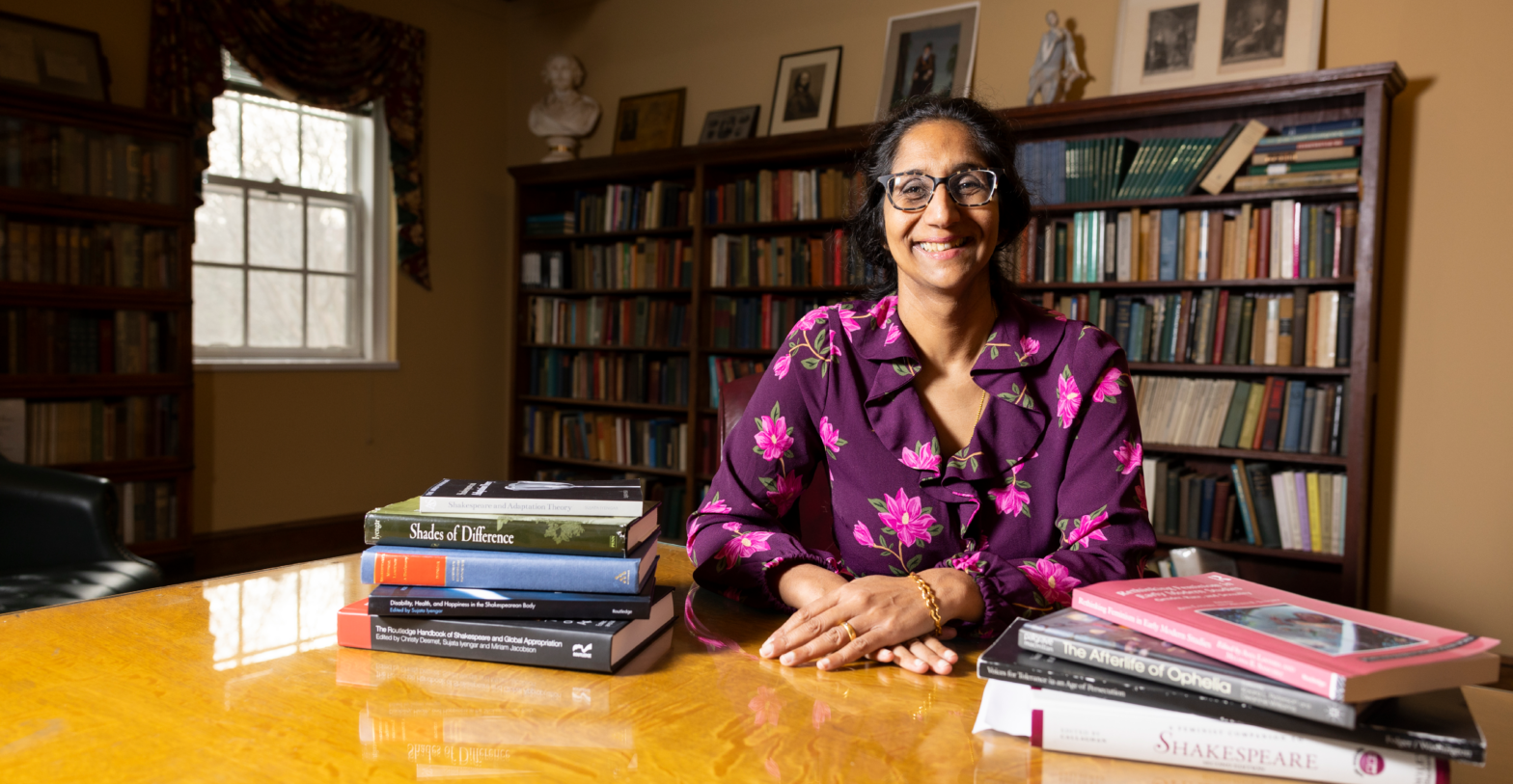As a schoolgirl in 1970s England, Sujata Iyengar was drawn to the language of Shakespeare. But still, she harbored some hostility toward his work, which was presented as something everyone should already know.
Iyengar’s parents had emigrated from India to work as physicians for the National Health Service, and she felt obliged to pursue a practical career herself. At the time, she had no intention of building a career around the Bard of Avon.
In fifth grade, her class studied prose adaptations of “Macbeth” and “Much Ado About Nothing.” Not long after, the BBC began screening television adaptations of Shakespeare’s plays, and she realized that, beyond the powerful language, these were scripts open to interpretation.
“I started seeing the plays as living documents and thinking about the richness of them,” she said. Her outlook began to change.
Iyengar is now a professor in the Franklin College of Arts and Sciences Department of English, where she has been faculty since 1998. Last year, she was named a 2023 Distinguished Research Professor at UGA’s annual Research Awards.
While working on her doctorate degree at Stanford University, Iyengar developed an interest in blushing—as in the reddening of the face—partly spurred by representations of it in Shakespeare. This physical manifestation of emotion can be seen throughout his works, from words that convey embarrassment in “Romeo and Juliet” to others that indicate some level of truth in an exchange.
It led her to an early inquiry into skin color and race, which was contextualized when she discovered the scholarship of Gretchen Gerzina and Peter Fryer, authors and academics who examined issues of race in Britain. Iyengar decided she wanted to do archival work on the history of race and immigration in that country, analyzing how people of color are represented.
“I was interested in what makes somebody ‘white,’” she said. “And I found that in the early modern period, many groups we would now call white, like the Scots or the Irish or Welsh or Spanish, were called black and that these words, ‘black’ or ‘white,’ when applied to human beings, were sort of slippery.”

The research led to her first monograph, “Shades of Difference: Mythologies of Skin Color in Early Modern England”(University of Pennsylvania Press, 2005). It remains one of her favorite projects. Hesitant to tout herself, she nonetheless recognized its significance.
“It was an important book and is foundational reading in what would be called premodern critical race studies,” she said.
After “Shades of Difference,” Iyengar’s publications were varied and extensive, including a second monograph, “Shakespeare’s Medical Language: A Dictionary” (Arden Shakespeare Dictionaries, 2011), a digital teaching collection focused on Shakespeare’s “Henry V,” and replated scholarly articles.
“I think the thread that goes through is how people make Shakespeare their own,” she said.
Iyengar’s most recent monograph, “Shakespeare and Adaptation Theory” (Arden Bloomsbury, 2023), was published shortly before Iyengar was feted as a Distinguished Research Professor at the 2023 Research Awards.
“‘Shakespeare and Adaptation Theory’ analyzes both the metaphors we use to describe Shakespearean adaptation—metaphors of evolution (‘adaptation’), theft (‘appropriation’), movement (‘translation’), and so on—and the vast range of adaptations themselves in different genres, from fine art to feature film, from meme to musical,” Iyengar said.
Iyengar described it as culmination of things she’s been thinking about her entire career.
In 2005, she cofounded the scholarly periodical “Borrowers and Lenders: The Journal of Shakespeare and Appropriation,” with late UGA colleague Christy Desmet. The publication, she said, has helped legitimize adaptation theory, which considers the transformation of Shakespeare’s plays into other media like film.
While Iyengar isn’t overly concerned about misappropriations of Shakespeare, there are absurd ones, such as Shakespeare-themed toilet roll holders or “Much Ado About Nothing” Post-it notes. Other more serious ones do concern her, such as the misappropriation of Shakespeare by white nationalists in the service of an imagined racially pure ideal.
“I was interested in what makes somebody ‘white,’” she said. “And I found that in the early modern period, many groups we would now call white, like the Scots or the Irish or Welsh or Spanish, were called black and that these words, ‘black’ or ‘white,’ when applied to human beings, were sort of slippery.”
– Sujata Iyengar, Franklin College of Arts & Sciences, Department of English
Adaptation theory can be sensitive in other ways, too. Iyengar noted, for example, that in writing the chapter on “Twelfth Night,” one of Shakespeare’s cross-dressing plays, she used the history of feminism and queer theory as a lens.
“I had to engage with gender theory and the issue of gender identity in a way that acknowledged the turmoil these terms and this language is going though right now while still being true to what the Shakespearean text and various adaptations say,” she explained.
Iyengar’s students benefit from thinking about appropriation and adaptation in unusual ways. In one undergraduate course, students interpreted objects such as a commemorative beer stein with a Hamlet scene as adaptations that might indirectly teach them something about Shakespeare’s world.
“It turns out there’s a stereotype in early modern England that the Germans and Danes are heavy drinkers because of the chilly, damp, Northern climate, and you find that stereotype in ‘Hamlet,’ she said of the student’s work. “Drunkenness is associated with these northern nations, along with whiteness, so it’s seen as a racial characteristic.”

It is through such teaching that Iyengar wants to leave a mark.
“Scholarship is meant to be superseded, so I don’t know if I want to have a lasting impact,” she said. “I hope that for some students, I have changed the way they think about things.”
Philip Gilreath, a former doctoral student now teaching at Northeastern University, said she has.
“Dr. Iyengar’s work on Shakespeare and appropriation has inspired my own approach to thinking about literature as a site of transformation,” he said. “She finds ways to use historical texts to explore important, contemporary ideas, while also tapping into what makes these texts so fascinating to read.”
Fittingly, Iyengar’s recent projects include a lecture, “Shakespeare and Climate Grief,” delivered online for Shakespeare’s Globe in London, and a UGA course connecting early modern literature and contemporary environmental literature.
Her current research on Shakespeare and the art of the book—how the form in which Shakespeare is received alters both his meaning and readers’ responses—requires her delving into everything from neuroscience to education theory.
“I use Shakespeare as a kind of space/time travel machine,” she said. “Shakespeare just lets me go anywhere I want.”






